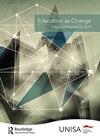安吉菲·德拉拉(1950-2020):《库·费巴》诗歌教学理念的更新体现
IF 0.8
4区 教育学
Q3 EDUCATION & EDUCATIONAL RESEARCH
引用次数: 2
摘要
安吉菲·德拉的诗歌和教学教义被认为是提高意识、治愈疾病和普及非殖民化教育的工具。通过ku femba(一种古老的习俗,在一个被暴力困扰的社会中,它是一种驱除邪恶咒语的渠道),Dladla展示了人类、祖先和超凡脱俗之间的关系,作为一种非殖民化的工具。他活泼的叙事诗《我辜负了我的孩子》和《Marikana Chorus》探索了根植于口头和书面传统的精神维度和无限可能性。Dladla的Femba写作计划,基于他的诗歌教学哲学,确认根植于非殖民化的诗歌不仅反映了诗人的政治信念,也反映了那些处于生存边缘的人的共同经验,他们有足够的能力挑战大师的声音(西方经典的声音),这些声音通常定义了诗歌的质量。Dladla对南非城镇的不稳定生活有着直接的了解;他利用自己积累的知识以及历史和记忆的复杂性来创作和教授引人入胜的诗歌,这些诗歌与普通人产生共鸣,而不会陷入将自己的经历狭隘化的陷阱。Dladla的诗歌和教学理念挑战了已经形成并继续影响南非诗歌教学的殖民实践。它们构成了在非殖民背景下界定非洲自我的更广泛议程的一部分。本文章由计算机程序翻译,如有差异,请以英文原文为准。
Angifi Dladla (1950–2020): An Embodiment of Ku Femba as a Poetry Teaching Philosophy for Renewal
Angifi Dladla’s poetry and teaching doctrines are considered tools for consciousness raising, healing and popular education for decoloniality. Through ku femba, an age-old practice that serves as a channel to cast away evil spells in a society bedevilled by violence, Dladla displays the relationship between man, ancestors and the otherworldly as a vehicle for decoloniality. His feisty narrative poems, “I Failed My Children” and “Marikana Chorus”, explore the spiritual dimension and infinite possibilities of experience rooted in oral and written tradition. Dladla’s Femba Writing Project, based on his philosophy of teaching poetry, affirms that poetry rooted in decoloniality reflects not only the poet’s political convictions, but a shared communal experience of those on the edges of existence who are capable enough to challenge the master’s voice (the voice of the Western canon) that often defines quality in poetry. Dladla is steeped in direct knowledge of the precarious life in South African townships; he draws on his accrued knowledge and on the complexities of history and memory to create and teach compelling poetry that resonates with the ordinary without falling into the trap of ghettoising his experience. Dladla’s poetry and teaching philosophy challenge the colonising practices that have shaped and continue to influence the teaching of poetry in South Africa. They form part of a wider agenda of defining African selfhood in a decolonial context.
求助全文
通过发布文献求助,成功后即可免费获取论文全文。
去求助
来源期刊

Education As Change
EDUCATION & EDUCATIONAL RESEARCH-
CiteScore
1.40
自引率
0.00%
发文量
29
审稿时长
24 weeks
期刊介绍:
Education as Change is an accredited, peer reviewed scholarly online journal that publishes original articles reflecting critically on issues of equality in education and on the ways in which educational practices contribute to transformation in non-formal, formal and informal contexts. Critique, mainly understood in the tradition of critical pedagogies, is a constructive process which contributes towards a better world. Contributions from and about marginalised communities and from different knowledge traditions are encouraged. The articles could draw on any rigorous research methodology, as well as transdisciplinary approaches. Research of a very specialised or technical nature should be framed within relevant discourses. While specialised kinds of research are encouraged, authors are expected to write for a broader audience of educational researchers and practitioners without losing conceptual and theoretical depth and rigour. All sectors of education are covered in the journal. These include primary, secondary and tertiary education, adult education, worker education, educational policy and teacher education.
 求助内容:
求助内容: 应助结果提醒方式:
应助结果提醒方式:


